alto flute
All scores that include a part for at least one alto flute.
Brahms ― Sonata, Op.120 No.1 ― Alto Flute
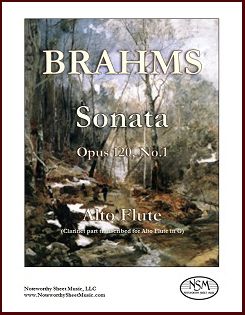 Sonata, Op.120 No.1, by Johannes Brahms
Sonata, Op.120 No.1, by Johannes Brahms
Transcribed for Alto Flute by J.W.Pratt
Alto Flute Part, PDF $8.99
Although written originally for clarinet, Brahms himself created two more versions of his Op.120 sonatas, for violin and viola. John W. Pratt, who transcribed these works for alto flute so expertly, writes in his foreword: "If Brahms was happy with versions for clarinet, viola, and violin, surely he would have welcomed arrangements for alto flute, especially since it is the mellow rather than the clarion aspect of the clarinet that he called on. In making our arrangements for alto flute, the violin versions have been particularly helpful, since the violin has the same lower range as the alto flute, but they required modification for several reasons. One, of course, is that the alto flute cannot play as loudly at the bottom of its range as the violin can. Another is that Brahms gave the violin double stops even though the clarinet is limited to a single voice." Our editions of the two Op.120 sonatas include only the alto flute parts, as Brahms' piano scores are freely available in the public domain. Here is a link to the listing of Op.120 No.1 on IMSLP.org, where the clarinet, viola, and violin versions with piano scores may be found. Our alto flute arrangements are based on the usual piano parts that accompany the clarinet as the solo instrument. The entire transcription of Op.120 No.1 works remarkably well, but the breathtakingly beautiful slow movement played on alto flute will steal your heart away.
Alto Flute part, 9 pages; Total 14 pages.
PreviewBrahms ― Sonata, Op.120 No.2 ― Alto Flute
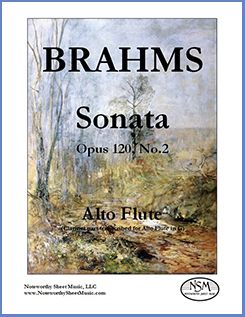 Sonata, Op.120 No.2, by Johannes Brahms
Sonata, Op.120 No.2, by Johannes Brahms
Transcribed for Alto Flute by J.W.Pratt
Alto Flute Part, PDF $8.99
This is the second of Brahms' two clarinet sonatas, transcribed for alto flute by John Pratt. Although written originally for clarinet, Brahms himself created two more versions of his Op.120 sonatas, for violin and viola. Mr. Pratt, who transcribed these works for alto flute so expertly, writes in his foreword: "If Brahms was happy with versions for clarinet, viola, and violin, surely he would have welcomed arrangements for alto flute, especially since it is the mellow rather than the clarion aspect of the clarinet that he called on. In making our arrangements for alto flute, the violin versions have been particularly helpful, since the violin has the same lower range as the alto flute, but they required modification for several reasons. One, of course, is that the alto flute cannot play as loudly at the bottom of its range as the violin can. Another is that Brahms gave the violin double stops even though the clarinet is limited to a single voice." Our editions of the two Op.120 sonatas include only the alto flute parts, as Brahms' piano scores are freely available in the public domain. Here is a link to the listing of Op.120 No.2 on IMSLP.org, where the clarinet, viola, and violin versions with piano scores may be found. Our alto flute arrangements are based on the usual piano parts that accompany the clarinet as the solo instrument.
Alto Flute part, 8 pages; Total, 12 pages.
PreviewBridge – 4 More Short Pieces – Flute or Alto Flute (and Piano)
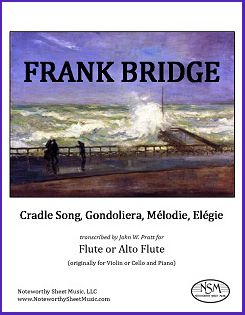 Cradle Song, Gondoliera, Mélodie, and Elégie, by Frank Bridge
Cradle Song, Gondoliera, Mélodie, and Elégie, by Frank Bridge
Transcribed for Flute or Alto Flute (and Piano) by J. W. Pratt
Flute Part, Alto Part, PDF $11.99
Like the 4 Short Pieces for Violin and Pianoforte published in transcription by Noteworthy Sheet Music previously, these additional four short pieces by Bridge "provide a fine and delightful introduction to an accessible post-romantic composer who should be better known." Published by Bridge between 1903 and 1911, the works included in our second edition are transcriptions of Cradle Song, written for violin or cello and piano, Gondoliera for violin and piano, and Mélodie and Elégie for cello and piano. Mr. Pratt has created transcriptions of all four pieces for both flute and alto flute, and we include both instrument versions in this combined edition. We think Cradle Song and Elégie are particularly beautiful on the alto flute, but all are effective on either instrument, so we prefer to let our flutists decide on which instrument they choose to play each piece. We provide our flute and alto flute parts only; the original piano scores work well with our transcriptions and are available, along with the violin and cello parts, as free pdf downloads at imslp.org—click the links to access the scores for Cradle Song, Gondoliera, Mélodie, and Elégie.
Flute part, 6 pages; Alto Flute part, 6 pages; Total, 14 pages.
PreviewBridge – 4 Short Pieces – Flute or Alto Flute (and Piano)
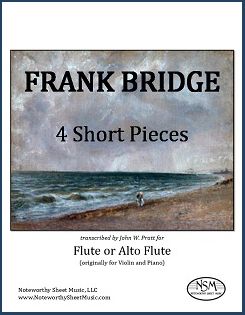 4 Short Pieces, by Frank Bridge
4 Short Pieces, by Frank Bridge
Transcribed for Flute or Alto Flute (and Piano) by J.W.Pratt
Flute Part, Alto Part, PDF $8.99
The 4 Short Pieces by Frank Bridge were written for violin and piano, and first published in 1912. As noted in John Pratt's foreword to the edition, they "provide a fine and delightful introduction to an accessible post-romantic composer who should be better known." The pieces are Meditation, Spring Song, Lullaby, and Country Dance. Mr. Pratt has created transcriptions of the violin parts for both flute and alto flute, and we include both instrument versions in this edition. We think Nos. 1 and 3 sound particularly nice on the alto flute and No. 4 is a splendid romp on the C flute, but all four are effective on either instrument, so we prefer to let our flutists decide on which instrument they choose to play each piece. We provide only our flute and alto flute transcriptions; the piano score, including the original violin part, is available as a free pdf download at imslp.org.
Flute part, 5 pages; Alto Flute part, 5 pages; Total, 14 pages.
PreviewBruch - Eight Pieces - Alto Flute
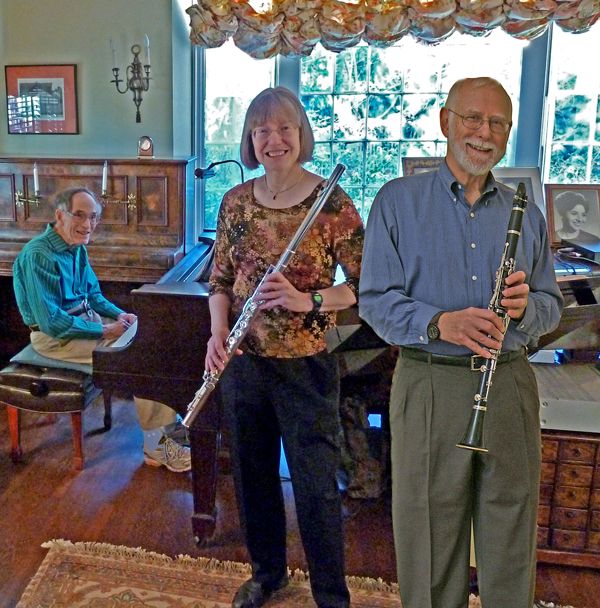 Acht Stücke, Op.83, by Max Bruch
Acht Stücke, Op.83, by Max Bruch
Transcribed for Alto Flute (with Clarinet and Piano) by Davies, Pratt, and Vater
Alto Flute Part, PDF $9.98
Originally scored for clarinet, viola, and piano (or violin, cello, and piano), Bruch's Acht Stücke (Eight Pieces) adapts nicely for a trio with clarinet, alto flute, and piano. Bruch's beautiful melodies are well served by the rich tones of the alto flute.
In creating this transcription of the viola part for alto flute, we have taken great care to maintain the spirit and character of the original instrumentation. We provide here the alto flute part. The piano and clarinet parts are readily available in the public domain as free pdf downloads of the score and parts. Here is a link to one such source: Piano Score and Clarinet Part
Alto Flute part, 17 pages; Total, 19 pages.
PreviewBurleigh - Southland Sketches, Nos. I, III, IV - Alto Flute or Flute (& piano)
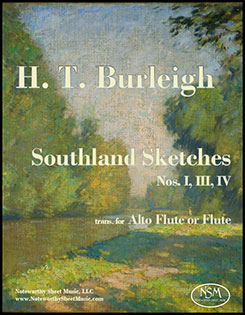 Southland Sketches, Nos. I, III, IV, by H. T. Burleigh
Southland Sketches, Nos. I, III, IV, by H. T. Burleigh
Transcribed for Alto Flute or Flute (and piano) by C. A. Vater
Alto Flute part and Flute part, PDF $9.96
Harry Thacker Burleigh was an acclaimed African-American singer, music editor, and composer whose adaptations of African-American spirituals became famous. His Southland Sketches, which were composed for violin and piano and published by G. Ricordi in 1916, are a fine example of Burleigh’s quintessential American style. The original composition included 4 movements. Our edition excludes the second movement, but adapts three of the original four miniatures for either alto flute or flute. We provide only the transcribed alto flute and flute parts, as they have been designed to work well with the piano part in the original score for violin and piano which is available as a good quality, free pdf download from imslp.org. Performers may choose to play all three of these pieces on either flute or alto flute, or switch instruments between sketches, depending on personal preference.
Alto Flute part, 6 pages; alternate Flute part, 6 pages; Total,18 pages. (pdf of piano accompaniment is freely available at imslp.org)
PreviewCoste - Cavatine - Afl + Pf
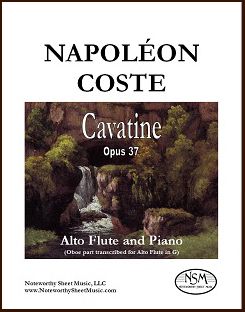 Cavatine, Op.37, by Napoléon Coste
Cavatine, Op.37, by Napoléon Coste
Transcribed for Alto Flute and Piano by C.A.Vater
Piano Score and Alto Flute Part, PDF $8.25
Napoléon Coste (1805-1883) was born in a small village in the Départment of the Doubs, France. He began to play guitar at the age of 6, studying with his mother who was an accomplished guitar performer. Napoléon himself began teaching and performing on guitar as a teenager. At age 24 he moved to Paris, where he studied under Fernando Sor, the renowned Spanish classical guitarist and composer. Coste quickly established himself as a virtuoso and is widely acknowledged as the dominant French guitarist of his era.
Coste became famous not only as a guitar soloist, but also as a major composer of some 60 works, most of which were written for guitar. His Op.37 "Cavatine" is a short, single-movement piece composed for piano and oboe (or violin or flute). The work is lovely, melodic but lively in places; it falls nicely within the range of the alto flute and sounds appealing and completely natural on that instrument. The Noteworthy Sheet Music edition includes a score for piano and alto flute, in addition to the transcribed alto flute part.
Alto Flute part, 3 pages; Piano Score, 8 pages; Total, 16 pages.
PreviewCoste - Les Regrets - Afl or Fl (or Ob, Vn) and Pf (or Guitar, Harp)
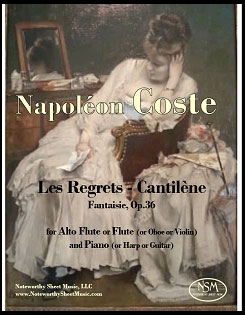 Les Regrets-Cantilène, Op.36, by Napoléon Coste
Les Regrets-Cantilène, Op.36, by Napoléon Coste
Transcribed for Alto Flute or Flute (or Oboe or Violin) and Piano (or Harp or Guitar) by C.A.Vater
Score, Alto Flute Part, and alternative Flute (or Oboe or Violin) Part, PDF $5.99
Napoléon Coste (1805-1883) became famous not only as a guitar soloist, but also as a major composer of some 60 works, most of which were written for guitar. His music is in the romantic French style and appreciated for its originality. His Fantaisie, Op.36, Les Regrets-Cantilène, is a short, single-movement piece written for oboe or violin with piano or harp or guitar. We created our Noteworthy Sheet Music edition from the difficult-to-read manuscript version in the public domain, available on imslp.org. We include a score in concert pitch and a part suitable for flute, oboe or violin, as well as a part transcribed for alto flute in G. The piece falls nicely within the sweet range of the alto flute and our transposition sounds appealing and completely natural on that instrument. In fact, Les Regrets-Cantilène is gorgeous on either flute or alto flute. Melodic and sentimental, the work is not overly demanding technically and should appeal to players of a moderate or higher skill level.
Score, 4 pages; Alto Flute part, 1 page; Flute (or Oboe or Violin) part, 1 page; Total 8 pages.
PreviewD’Indy - Choral Varié, Op.55, trans. Alto Flute
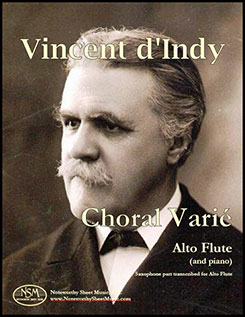 Choral Varié, Op.55, by Vincent d’Indy
Choral Varié, Op.55, by Vincent d’Indy
Solo part transcribed for Alto Flute by C. A. Vater (originally for saxophone or viola)
Part for Alto Flute, PDF $5.99
D’Indy composed his Choral Varié pour Saxophone solo (ou Alto) et Orchestre, Op.55 in 1903. The composer also created an orchestral reduction arrangement, published by Durand, Paris, 1903, for alto saxophone (or viola) and piano; it is this edition that we used as the basis for our transcription of the solo part for alto flute. The Choral Varié piece is appealing and distinctive, solemn and tender. It adapts nicely to the alto flute, highlighting the beautiful, intimate quality of that instrument’s low-register tones. Our publication provides only our transcribed alto flute part; the piano part, published as the composer’s score in concert pitch for solo and piano, is freely available as a PDF download from imslp.org.
Alto Flute part, 3 pages of music; Total, 6 pages.
PreviewDebussy - Première Rhapsodie - Alto Flute
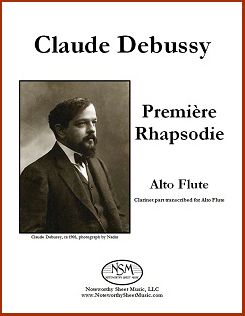 Première Rhapsodie, by Claude Debussy
Première Rhapsodie, by Claude Debussy
Transcribed for Alto Flute by C.A.Vater, with a Foreword by P.H.Bloom
Alto Flute Part ― PDF $5.99
Since its introduction as a morceau de concours for the Paris Conservatoire in 1910, Debussy's Première Rhapsodie has been an essential piece of the clarinet repertoire. ... Although most of the morceaux are, by definition, run-of-the mill exercises of virtuosity à la mode, a number have endured as works of significant musical merit. Debussy's Première Rhapsodie is one such piece. It's a vehicle for expressive interpretation and artistry, with charm, warmth, passion, and humor; a lasting treasure at the core of every clarinetist's collection of indispensable works. ... But a transcription? Of a work by Debussy - the great colorist of instrumental sonority? From clarinet to alto-flute? ... Each and every element, in fact, evokes the alto-flute! ... Of course the piece sounds different on the two instruments. Although the sonic hues are different, the colors are just as vivid. The distinct sonorities of the alto-flute support the nuance, the affect, and the power of the work. (excerpted from Peter H. Bloom © 2012)
We provide our alto flute part only; appropriate parts for piano or orchestral accompaniment may be obtained as free pdf downloads from public domain resources, such as imslp.org.
Alto Flute part, 4 pages; Total, 10 pages.
Preview